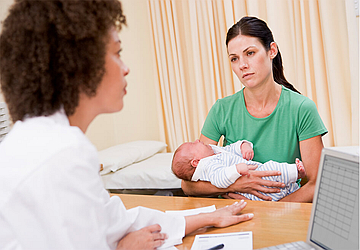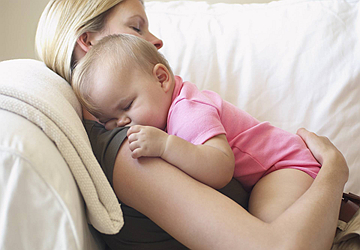Discover the signs of postpartum depression in our comprehensive guide. Learn about maternal mental health, its importance, and how to seek help. Understand the experiences of new mothers and the steps to take for a healthier, happier postpartum period.
Welcoming a baby into the world can bring a mix of emotions, from joy and love to, sometimes, sadness and anxiety. In the flurry of new routines and sleepless nights, it can be challenging to distinguish between everyday stress and something more serious.
Our guide on "How To Recognize Postpartum Depression: A Guide For Maternal Mental Health" aims to shed light on this vital topic. New mothers need to understand that it's okay to ask for help and seek treatment. This guide aims to educate about the signs of postpartum depression and provides resources for support, promoting healthier, happier journeys into motherhood.
The Difference Between "Baby Blues" and Postpartum Depression
The "baby blues" and postpartum depression are sometimes confused with one another, which is a frequent mistake. The so-called "baby blues," which often begin a few days after delivery and can linger for as long as two weeks, are marked by extreme shifts in mood, bouts of sobbing, anxiety, and difficulties sleeping. On the other hand, some moms may suffer from a more severe and persistent form of sadness after giving birth, which is called postpartum depression (PPD). It is vital to recognize the difference between these two states to identify PPD and begin the proper treatment at the earliest possible stage.
Recognizing the Symptoms of PPD
Unlike the "baby blues," PPD symptoms are more intense and can manifest at any point within the first year after childbirth. Mood swings, crying fits, trouble bonding with the baby, isolation from loved ones, changes in eating and sleeping habits, excessive fatigue, loss of interest in once-enjoyed activities, heightened irritability, and thoughts of worthlessness or guilt are all symptoms of postpartum depression and maternal depression. In severe cases, there may even be thoughts of harming oneself or the baby. Understanding these symptoms is crucial for both the mother and her family.
The Impact of PPD on Mother and Child
The ramifications of maternal depression are far-reaching and extend beyond the mother's psychological well-being. It has the potential to disrupt the crucial process of bonding between a mother and her infant, which in turn may result in a delay in the baby's intellectual and emotional development. In addition, untreated major depressive disorder (MDD) can linger for months or even longer, progressing to chronic depressive disorder.

Seeking Help: Treatment and Support Options
Seek medical attention immediately if you or a loved one exhibits symptoms of PPD. They can provide a thorough diagnosis and develop a suitable treatment plan. Support for postpartum emotional health often includes psychotherapy (talk therapy), cognitive-behavioral therapy (CBT), interpersonal therapy (IPT), and in some cases, medication. Seeking assistance is not a sign of weakness but a powerful act toward healing.
The Role of the Community in Providing New Mom Support
The first few months after giving birth can be an overwhelming experience for new mothers. The physical recovery, coupled with the responsibility of nurturing a new life, can lead to stress and fatigue. This is where the role of the community becomes pivotal. Supporting a new mother should be seen as a communal effort, a collective responsibility everyone shares.
From family members to friends, neighbors, and local community groups, everyone can contribute to creating a supportive environment for new mothers. This support can manifest in different ways. For example, friends and family can offer to help with the baby, allowing the new mother to rest or have some personal time. They can also help with household chores or run errands, reducing the burden on the new mom.
Having a listening ear is another essential form of new mom support. Letting new mothers express their feelings and concerns without judgment can be immensely helpful. It allows them to vent their stresses and anxieties, relieving them emotionally.
Providing meals is also an excellent way to support new moms. With all the responsibilities of a new baby, finding time to prepare nutritious meals can be challenging for new mothers. By delivering home-cooked meals, friends and neighbors can ensure that the mother is well-nourished, which is crucial for her recovery and well-being.
Understanding the Root Causes of PPD
Postpartum depression is widely believed to have its origins in the profound psychological and physiological shifts that a new mother experiences. After giving birth, a woman's levels of certain hormones, namely estrogen and progesterone, drop dramatically; as a result, she may suffer changes in her mood as a result of this. Low levels of other thyroid hormones can also play a role in the symptoms of exhaustion, sluggishness, and sadness experienced by women. PPD can occur when the stress of caring for a newborn is combined with the biological factors that contribute to the stress.

The Role of a Healthy Lifestyle in Managing PPD
It is possible to overcome postpartum depression by adjusting one's way of life with the guidance of qualified medical professionals. A woman's physical and mental health can improve if she maintains a healthy diet and regular exercise routine and gets the recommended amount of sleep each night. In addition to these advantages, training oneself to be mindful through meditation, yoga, and breathing exercises can be helpful.
Preventing Stigmatization and Promoting Open Dialogue
Due to concerns about being judged or misunderstood, many women avoid getting care for postpartum depression (PPD). The importance of education in fighting this prejudice is crucial. By encouraging women to talk openly about their experiences with PPD, we can mainstream their feelings and increase the number of women who reach out for support. Don't let the stigma of PPD hold you back. Any woman of any age, of any color, or any socioeconomic class is vulnerable to this complication of childbirth.
When to Seek Emergency Help
While postpartum depression is a severe condition, it is also essential to be aware that some women may have postpartum psychosis, which is a more severe type of postnatal mental illness. Symptoms of this sporadic disorder include delusions, a loss of touch with reality (also known as psychosis), aggressive conduct, and thoughts of ending one's life. If you or a loved one are experiencing these symptoms, you should seek immediate medical attention.
Conclusion
It's crucial to remember that it's appropriate to ask for help when navigating postpartum depression. It is possible to ensure that every woman receives the help she needs by recognizing the warning signals and taking action toward treatment and recovery. A safer and better society for mothers and infants can be achieved by taking a more comprehensive approach to maternal mental health.







